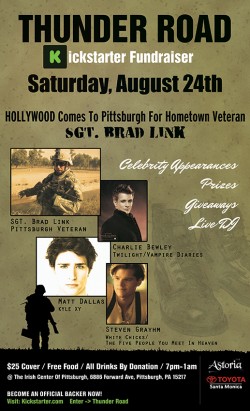Pittsburgh has always had a hand in the film world- being one of the most popular go-to locations for filming. One film in particular (Thunder Road) has taken a much deeper root in our city -rather than filming in our beloved home, has decided to tell the tale of a local war veteran, Brad Link. The film will show the struggles of soldiers in combat who have battled PTSD (Post Traumatic Stress Disorder) and TBI (Traumatic Brain Injury)- very serious conditions that develop in many vets. What was once referred to simply as “shell shock” has now become a very serious problem for many men and woman who fight for our freedom. So serious that many of these brave individuals have taken their own lives after surviving the atrocities of war. Film team, Steven Grayhm, Charlie Bewley, and Matt Dallas are attempting to shed some light on the stories of these brave souls and show the true effects of war. The team has already begun the process of fundraising for Thunder Road and is actually coming to Pittsburgh this Saturday, August 24 at the Irish Center of Pittsburgh, 6886 Forward Ave at 7 p.m. Come and show your support for the film and help them reach their goal. We here at Maniac are more than excited about Thunder Road and we hope this new project touches other hearts across the U.S. as well. We got a chance to get an additional look into Thunder Road and it’s mission. We hope you all are just as enthusiastic about this project as we are.
-How did Thunder Road come about? Was it an easy idea that quickly came together?
Steven: Well, it was about two years ago. I had been writing a journal back in 2003 when the war broke out. I want to keep the country and the world in line with trying to create a public conversation about PTSD . I also went on a road trip and met soldiers and their families and doctors and we realized there was so much more to the story [of PTSD and effects of war].
-Was the film initially inspired by Brad Link or the concepts of PTSD and TBI?
Steven: A lot of what went into the movie came before we met Brad and we also got a first glimpse into that world. Brad came into it all because we met several combat soldiers and they told us we gotta meet with this guy. After our road trip was over, we reached out to him. Then he invited me to come out and meet with him and we didn’t know how it would work out. I didn’t know that he was going to inspire my character. I even got to live with his family and was very fortunate. He has this incredible story and that’s what helped mold my character, Sargeant Calvin Cole.
Matt: Brad was a normal average guy and it was such an extraordinary circumstance; how he coped and overcame. It was an inspiring story.
-What audience is Thunder Road intended to target?
Steven: It’s an older demographic: 18 or older. At it’s core, it’s an underdog story that deals with a lot of very adult themes. It basically gives you the world of a combat soldier.
-What will the audience take away from the film? Will Thunder Road most likely be the movie that people will identify PTSD with?
Steven: We’re hoping that they gain a greater understanding of what our men and women who are put in a situation go through. We are wanting to start a conversation across the country about this. When films are based on biographies, like Lincoln, for example, all of a sudden we were talking about civil rights again. It brings compassion and understanding. It gives a voice to those who don’t have one. I think that this will be the first of its kind.
-Is the film more or less a documentary or rather an expository piece?
Steven: Expository. It’s a feature I spent two years writing. It lets the audience decide what to think- we have no political standpoint. It’s a linear story that’s told through fictional characters but based on one hundred percent real accounts. We aim to spark a conversation. We hope that the epidemic is something that we can work toward as a society to abolish.
– So far, what are the filming locations for Thunder Road?
Matt: As of right now, we’re hoping to film in Detroit in the winter. The second location- we’re still looking into it.
-What is the goal of the fundraiser?
Matt: Our goal is $750,000 by September 12th. If we don’t reach it, we’re going to try another route. We are going to do whatever it takes.
-What do many people not know about PTSD and/or TBI? Will the audience learn anything new about them after seeing Thunder Road?
Matt: Absolutely. With this film, we are aiming to educate as well as entertain and shed some light on PTSD and the struggles men and women face after war. As far as something many don’t know- there is definitely a stigma associated with PTSD. Many think of their grandfathers and fathers who served having PTSD but there are many who are around 19 who come home from combat with the same conditions.
-How will Thunder Road change the way people view PTSD and TBI?
Matt: I think it will raise awareness and instill compassion for people dealing with PTSD. It will begin a conversation that the country needs to be having.
-Why hasn’t Hollywood touched on these subjects of war before?
Matt: I think that Hollywood is stuck on a certain formula on what they think works. This is an almost taboo subject and [Hollywood’s] afraid the general public does not care. But millions of people are directly and indirectly affected by PTSD and people do care.
-We’ve been meaning to ask. What’s the story behind the title?
Matt: Well, I can’t reveal it but it’s a metaphor and it’s not specific to a character. It’ll be revealed at the end of the movie.
www.thunderroadfilm.com













